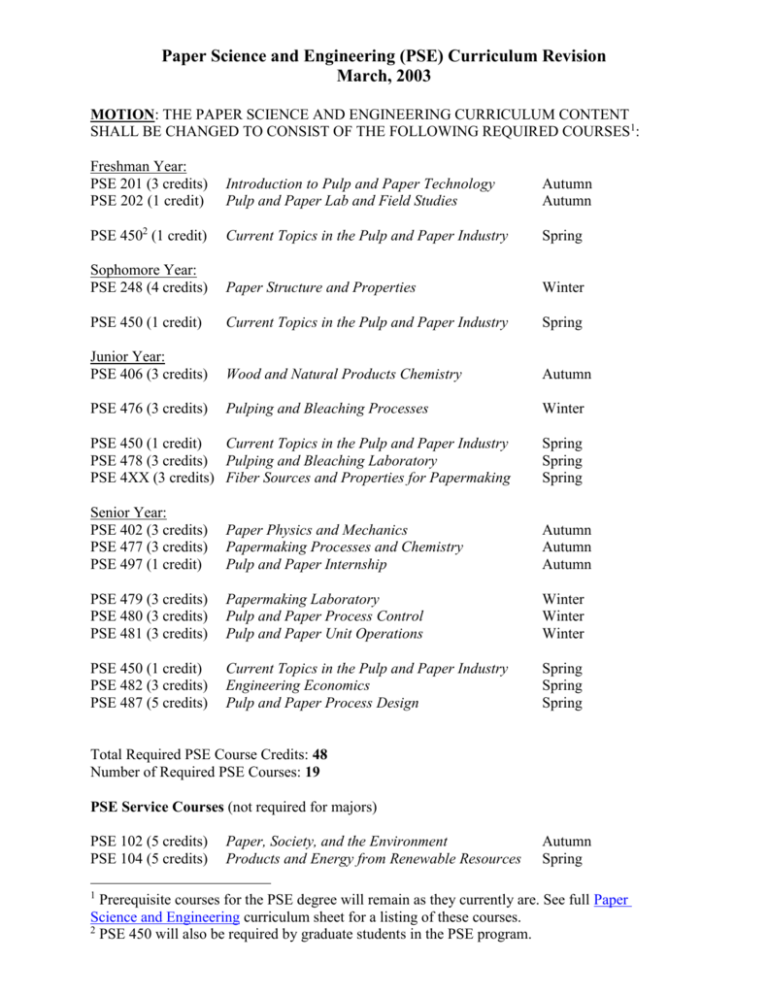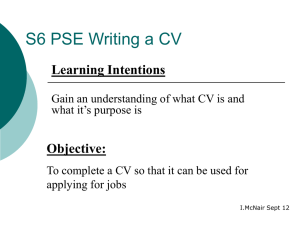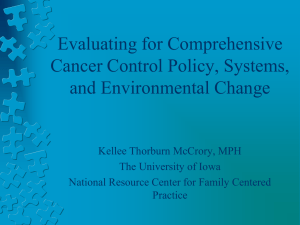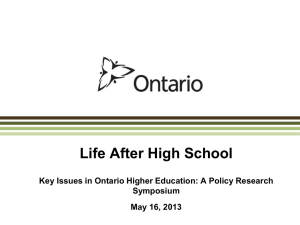Paper Science and Engineering
advertisement

Paper Science and Engineering (PSE) Curriculum Revision March, 2003 MOTION: THE PAPER SCIENCE AND ENGINEERING CURRICULUM CONTENT SHALL BE CHANGED TO CONSIST OF THE FOLLOWING REQUIRED COURSES1: Freshman Year: PSE 201 (3 credits) PSE 202 (1 credit) Introduction to Pulp and Paper Technology Pulp and Paper Lab and Field Studies Autumn Autumn PSE 4502 (1 credit) Current Topics in the Pulp and Paper Industry Spring Sophomore Year: PSE 248 (4 credits) Paper Structure and Properties Winter PSE 450 (1 credit) Current Topics in the Pulp and Paper Industry Spring Junior Year: PSE 406 (3 credits) Wood and Natural Products Chemistry Autumn PSE 476 (3 credits) Pulping and Bleaching Processes Winter PSE 450 (1 credit) Current Topics in the Pulp and Paper Industry PSE 478 (3 credits) Pulping and Bleaching Laboratory PSE 4XX (3 credits) Fiber Sources and Properties for Papermaking Spring Spring Spring Senior Year: PSE 402 (3 credits) PSE 477 (3 credits) PSE 497 (1 credit) Paper Physics and Mechanics Papermaking Processes and Chemistry Pulp and Paper Internship Autumn Autumn Autumn PSE 479 (3 credits) PSE 480 (3 credits) PSE 481 (3 credits) Papermaking Laboratory Pulp and Paper Process Control Pulp and Paper Unit Operations Winter Winter Winter PSE 450 (1 credit) PSE 482 (3 credits) PSE 487 (5 credits) Current Topics in the Pulp and Paper Industry Engineering Economics Pulp and Paper Process Design Spring Spring Spring Total Required PSE Course Credits: 48 Number of Required PSE Courses: 19 PSE Service Courses (not required for majors) PSE 102 (5 credits) PSE 104 (5 credits) 1 Paper, Society, and the Environment Products and Energy from Renewable Resources Autumn Spring Prerequisite courses for the PSE degree will remain as they currently are. See full Paper Science and Engineering curriculum sheet for a listing of these courses. 2 PSE 450 will also be required by graduate students in the PSE program. Background for PSE Curriculum Revisions 1. The PSE program underwent an extensive review for accreditation by ABET (Accreditation Board for Engineering and Technology) during Autumn quarter 2001. One of the findings from this review was that there was not much flexibility in coursework choices due to the large number of required PSE courses. It was recommended that the faculty and Washington Pulp and Paper Foundation (WPPF) curriculum committees consider revising the curriculum to reduce the number of required courses, and thus allow the students more choices of technical electives. 2. Exit interviews with graduating seniors and surveys of PSE alumni indicated that redundancy and overlap existed in the content of PSE courses. Various suggestions were made as to how to address this redundancy by eliminating and/or combining required courses. 3. Discussions with the WPPF curriculum advisory committee suggested that we should change the curriculum to reflect more emphasis on paper product design and applications, and less on classical process engineering and optimization. This trend has been evident in the pulp and paper industry for the past few years. 4. The PSE faculty agreed that it was indeed time to consider changes in the curriculum , and held a 1/2-day retreat in June 2002 to begin discussions towards this end. A summary of these discussion was prepared, and 4 subgroups of faculty were formed to specifically review and make recommendations on each of the following 4 course categories: a. b. c. d. Freshman/Sophomore courses Pulping and Chemistry courses Fiber Science/Papermaking courses Engineering courses These four groups met during Autumn quarter 2002 and specific course change recommendations were made and documented. 5. The PSE faculty again held a 1/2-day retreat in December 2002 to consider specific recommendations of the various course subgroups. The course changes listed above were agreed upon by the faculty and documented in a written summary. This resulted in a reduction of 8 credits in required PSE courses. 6. Curriculum changes were reviewed and discussed with the WPPF curriculum advisory committee via a teleconference in early February. Their feedback was then considered by the PSE curriculum committee (which includes two student members) . A key recommendation of the WPPF committee was to develop specific course lists for the elective credits now freed up by course consolidation. Other Curriculum Issues of Note Changes have been made to certain PSE courses in order to make them more attractive to other students in the CFR, the chemical engineering program, and the University in general. The following are a list of these changes: a. PSE 302 has been split into separate lecture and lab/field trip courses, PSE 201/202. This will allow non-majors to register for PSE 201 (3) as a lecture class alone, which serves as an introductory course to Paper Science and Engineering. This course would be very suitable for many students in the “non-PSE” curriculum of the CFR to acquaint them with the basic issues in the field. b. PSE 406, formerly Wood Chemistry, will be renamed Wood and Natural Products Chemistry and will be broadened to cover some chemistry of plants in general. Pulping and bleaching chemistry formally covered in this course will now be covered elsewhere in the curriculum. This will make this course more useful and suitable for non-PSE students in the College. c. Working in conjunction with the Chemical Engineering department, 3 PSE courses will be approved substitutions for required CHEM E courses: 1. PSE 479 (Papermaking Laboratory) for CHEM E 437 (Unit Operations Lab II) 2. PSE 480 (Pulp and Paper Process Control) for CHEM E 480 (Chem. Engr. Process Control) 3. PSE 487 (Pulp and Paper Process Design) for PSE 486 (Process Design II) These approved substitutions, along with promoting student awareness, should increase enrollment in PSE courses.







